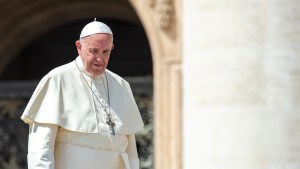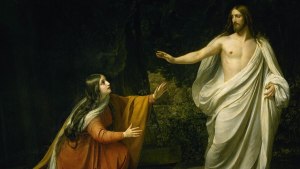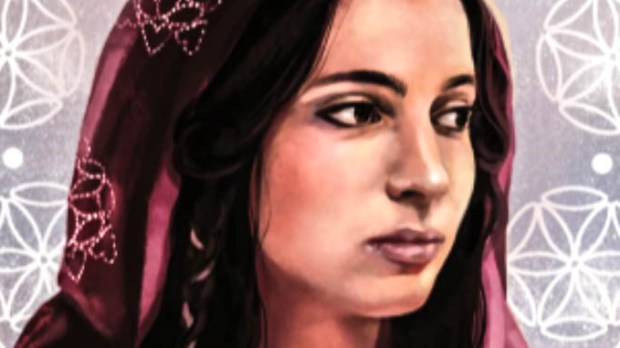Mary Magdalene is one of the great women of the Church — someone who provided for Christ out of her resources and stayed faithful to Him to the end. Then, she was the first one to receive the truth of the Resurrection.
Author Jennifer Ristine has “gotten to know” this great woman by living in her hometown for the last four years.
She’s collected her insights — spiritual, archaeological, scriptural — into a book, released from Magdala just in time for the Feast of Mary Magdalene on July 22.
Read more:
Mary Magdalene, “Apostle to the Apostles,” Given Equal Dignity in Feast
Aleteia asked Ristine to share with us some of what she’s found and shared with the world in Mary Magdalene: Insights from Ancient Magdala.
You’ve had a chance to truly “befriend” Mary Magdalene. Tell us about her. What is she like?
Jennifer Ristine: I believe that she is bold and an encourager, always desiring to point the way to Jesus. This is what I have experienced through the years.
Around 2006 several passages of Sacred Scripture that I associated with Mary Magdalene began speaking to me personally. I admired her pure and passionate love for Jesus and her fidelity at the foot of the cross. When I say “pure” love, I refer to a love that is centered on Jesus above all else, and all other things fall into their place: affections, material objects, motives for acting. I realized how easy it is in life to make idols of people, things and self. I began to befriend her, asking for her intercession as a consecrated woman, desiring that same passionate love for Jesus as the inspiration behind all my motives.
In 2014 I received a call from my superior asking if I would consider helping with the project at Magdala in the Holy Land. For me, it felt like she had a hand in inviting me to her hometown. Over the course of my almost four years in Magdala, her humanness has struck me. I have admired how Jesus stepped into the messiness of her life and she “gave him permission” to change her life, to give her life meaning. Luke 8:2-3 mentions her as one of the women who accompanied Jesus, helping him with her own resources. But I believe that she must have felt that finally she was accompanied by someone who truly understood her and loved her unconditionally. That was the impetus for her loyalty and ultimately, for her evangelizing spirit.
After your years in her homeland, how do you see her role in the Church differently?
I don’t see her role any differently than I had before, but as mentioned previously, her humanness struck me. I have also been amazed at her continued evangelizing spirit. In the communion of saints we have the possibility of partnering with those who have gone before us. I believe that she is still very active as Jesus’ faithful disciple. I have seen it with my own eyes in Magdala. Her life story speaks to Jews, Christians, Mormons, Muslims, atheists, etc. In this way, she creates a bridge of solidarity among women in their own life struggles and challenges.

Read more:
Overwhelmed by struggles? Don’t forget this incredible communion is praying for you!
Especially for women, perhaps, Mary Magdalene has a message. What might that be?
Mary Magdalene is an icon of hope for women at all stages and situations of life. I have seen women of different ages and faith backgrounds look to her in admiration, particularly for what is perceived as her transformation and boldness in sharing the Good News. Different opinions abound about the nature of her seven demons, but ultimately she is liberated from what oppressed her and set out on a new way, taking with her the qualities she still possessed.
The message of the transforming power of unconditional love speaks to everyone, even those with no faith background. Essentially, it is the message of redemption and the gift of “shedding” the old woman and being made new. Her transformation was first for herself, but then for others to open their eyes to the possibility for their own lives.
At times, this message can be hijacked from too much focus on her name “being slurred” as a prostitute throughout history. The fact is, we do not know from Scriptures the cause of her “seven demons.” But we do know the end result and consequence of it. We know the Good News! There is a tendency to focus on liberating her from this bad name. But she was already liberated and the beautiful message is right before our eyes: The love of God is always present, hence there is always reason to maintain hope, no matter our life circumstance.
What led you to write this book? Was there more that needed to be said? Or a message that our own day has never heard before?
I confess that I have asked myself that same question … why am I adding to the pile of books out there on Mary Magdalene? But I feel that I have a perspective from the “inside.” I have lived in the Holy Land, specifically in her hometown, for these last four years. I have heard the countless questions people ask about her, despite all the existing literature. And I have heard what various guides, tour leaders and visitors think about her, at times a mix of eclectic ideas that don’t jibe with the canonical scriptural account.
Last year we had more than 130,000 visitors to Magdala to visit her ancient hometown. They requested books on Mary Magdalene and on ancient Magdala. I decided to address all of these desires and needs in one book. I also wanted to integrate, using my gospel imagination, several passages that could illustrate her own experience of Jesus if she had indeed been living in Magdala at the time of Jesus’ public ministry. I attempt this in one part to help us reflect on her journey from curious bystander in need of being set free to faithful disciple still learning what it meant to follow Jesus, to zealous “Apostle to the Apostles.”
My hope is that it can serve a wide audience as a glimpse into her hometown and the mystery of her person by offering my insights through archaeology, Scripture, tradition and spiritual reflections.
I also hope it can inspire readers to reflect on their own life journey in whatever way they may identify with Mary Magdalene.
Finally, I hope it can serve as an act of gratitude to the Lord for my time serving in Magdala and to her for accompanying me in my own life journey.

Read more:
Considerations on the idea that Mary Magdalene was a prostitute

Read more:
Joaquin Phoenix is deeply inspired by Jesus after playing him in ‘Mary Magdalene’

